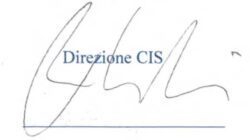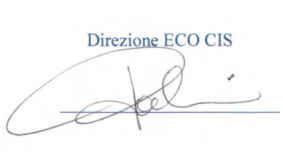Certificazione ISO 9001:2015 POLITICA INTEGRATA PER LA QUALITA’ E L’AMBIENTE
I management aziendali di C.I.S. SpA ed ECO CIS Srl sono impegnati per una crescita dell’azienda che tenga conto in primo luogo della soddisfazione del cliente, dei dipendenti, delle leggi e dei principi etici.
Credono che sia fondamentale, per il raggiungimento di questi obiettivi, seguire una politica per la qualità e una gestione aziendale conformi ai principi della norma UNI EN ISO 9001:2015 certificati da un Organismo di parte terza accreditato.
L’impegno della ricerca della soddisfazione degli utilizzatori dovrà essere mantenuto e migliorato nel rispetto delle norme applicabili, nel rispetto dell’ambiente e del rapporto etico e trasparente con il cliente.
La politica della qualità stabilita prevede in tutti i processi la pianificazione, l’ottimale esecuzione, il controllo, il monitoraggio e l’analisi finalizzata al miglioramento continuo. La revisione ed il riesame del sistema dovrà avvenire con cadenza almeno annuale, con l’intervento di tutte le funzioni interessate.
La responsabilità della tenuta sotto controllo del sistema in funzione della politica della qualità decisa è della Direzione con la collaborazione operativa del responsabile della qualità RSQ. Compito di RSQ, ai fini del rispetto della politica della qualità è quello di assicurarne la comunicazione, la consapevolezza e la comprensione a tutti i livelli.
La direzione è impegnata a ridefinire annualmente gli obiettivi per la qualità sulla base dei risultati e delle indicazioni fornite dal riesame.
Nella concezione del miglioramento continuo ECO CIS ha voluto implementare anche un sistema di gestione ambientale certificato secondo lo standard UNI EN ISO 14001:2015:
La Politica per l’Ambiente definisce gli obiettivi ed i principi d’azione della ECO CIS Srl nell’ambito delle proprie attività di “INTERMEDIAZIONE DI RIFIUTI PERICOLOSI E NON PERICOLOSI, senza detenzione”, nel rispetto dei requisiti ambientali e per la soddisfazione dei propri clienti .
L’Organizzazione intende pertanto perseguire una politica che, oltre a soddisfare i requisiti richiesti dai propri clienti, consideri la tutela dell’ambiente e delle risorse naturali come parte integrante del proprio processo di sviluppo, nel rispetto ed in armonia con i principi sanciti dalle norme comunitarie e nazionali a riguardo.
Al fine di garantire che l’attività dell’organizzazione sia svolta nella tutela dell’Ambiente, non solo in termini conservativi ma come valorizzazione dello stesso, la Direzione definisce come principi di riferimento della propria Politica Ambientale:
Obbiettivi per l’ambiente
L’organizzazione considera il proprio impegno in materia ambientale con eguale attenzione a tutte le altre esigenze di tipo gestionale-organizzativo.
Periodicamente e sistematicamente:
- Pianifica e mette in atto gli obiettivi ambientali e i relativi traguardi;
- Controlla con continuità l’andamento di tali programmi, apportando, se necessario,le opportune azioni correttive.
Impegno alla protezione dell’ambiente e al miglioramento
L’Organizzazione si impegna ad organizzare le proprie attività ottimizzandone la gestione ambientale in accordo al programma di miglioramento annuale; in particolare il proprio comportamento ecosostenibile indirizzerà tutta l’attività svolta in primis verso la politica del recupero piuttosto che dello smaltimento, laddove sarà possibile applicarlo. Saranno pertanto privilegiate soluzioni impiantistiche che attuano tale recupero nel rispetto del principio di prossimità e vicinanza.
Impegno a soddisfare i requisiti di qualità ambientale
L’organizzazione si impegna a comprendere le necessità dei clienti e pianifica le proprie attività per soddisfarle appieno. Allo stesso modo opera nel rispetto delle richieste e dei requisiti:
- Del mercato di riferimento;
- Del Paese in cui opera, adempiendo a leggi e regolamenti;
- Di tutte le parti coinvolte nei propri processi critici
Impegno al rispetto della legge
L’Organizzazione nel rispetto di leggi, adempimenti, ordini e discipline ha come obiettivo primario la promozione dei livelli di qualità della vita umana, da realizzare attraverso la salvaguardia ed il miglioramento delle condizioni dell’ambiente e l’utilizzazione accorta e razionale delle risorse naturali.
Comunicazione
L’organizzazione:
- Ricerca un dialogo aperto con le parti interessate al fine di far comprendere gli impatti ambientali delle attività e I propri principi ambientali;
- Tiene in considerazione le richieste dei dipendenti.
Coinvolgimento del personale e degli stakeholder
L’Organizzazione si impegna a rendere i propri dipendenti, collaboratori e tutte le parti interessate in genere, consapevoli dei rischi connessi con le attività operative al fine di metterli in condizione di operare responsabilmente e consapevolmente.
L’Organizzazione promuove lo sviluppo professionale mediante interventi formativi, addestramento e sensibilizzazione della propria forza lavoro rispetto alle tematiche della qualità e dell’ambiente.
La norma UNI EN ISO 9001:2015 applicata da entrambe le organizzazioni e la norma UNI EN ISO 14001:2015 applicata esclusivamente da ECO CIS, garantiscono un pieno controllo dei processi, dei rischi, delle opportunità aziendali e della gestione ambientale permettendo la prevenzione di anomalie ed il miglioramento continuo del servizio, ottimizzando i processi e valorizzando le risorse umane.
Livorno, 7 agosto 2019


OPERATORE ECONOMICO AUTORIZZATO (AEO)
Il nuovo codice doganale comunitario ha introdotto la figura dell’Operatore Economico Autorizzato (AEO), ovvero di quell’operatore la cui affidabilità sia stata certificata da un percorso di valutazione dell’Agenzia delle Dogane.
La certificazione AEO è riconosciuta dai 27 Paesi della Comunità e da luogo ad una serie di benefici quali la riduzione dei controlli, una corsia preferenziale e quindi una maggiore velocità nelle operazioni doganali, la semplificazione per l’ottenimento di alcune autorizzazioni.
La certificazione quindi è anche uno strumento con cui C.I.S. può assicurare un miglior servizio.
Tutti gli operatori che direttamente o indirettamente compiono attività legate all’import-export e quindi che hanno attinenza con l’attività doganale, se ne hanno i requisiti, possono richiedere la certificazione AEO.
Tanti più operatori della catena logistica sono certificati (ditta importatrice/esportatrice, spedizioniere, magazzini, terminal portuale, etc.), tanto meno saranno i controlli sulle merci trattate, con benefici in termini di costi e di tempo perso.
Per questo C.I.S. promuove la certificazione dei propri clienti e si mette a loro disposizione per assisterli nella richiesta AEO presso l’Agenzia delle Entrate.
Pesatore autorizzato
C.I.S. Spa ha ottenuto dall’Agenzia delle Dogane e Monopoli lo status di ‘pesatore autorizzato’ di banane fresche, secondo le previsioni dell’art. 163 del Regolamento Delegato (UE) n.2446/2015, ed è quindi autorizzata all’emissione delle ‘note di pesatura’ relativamente all’importazione di banane fresche.